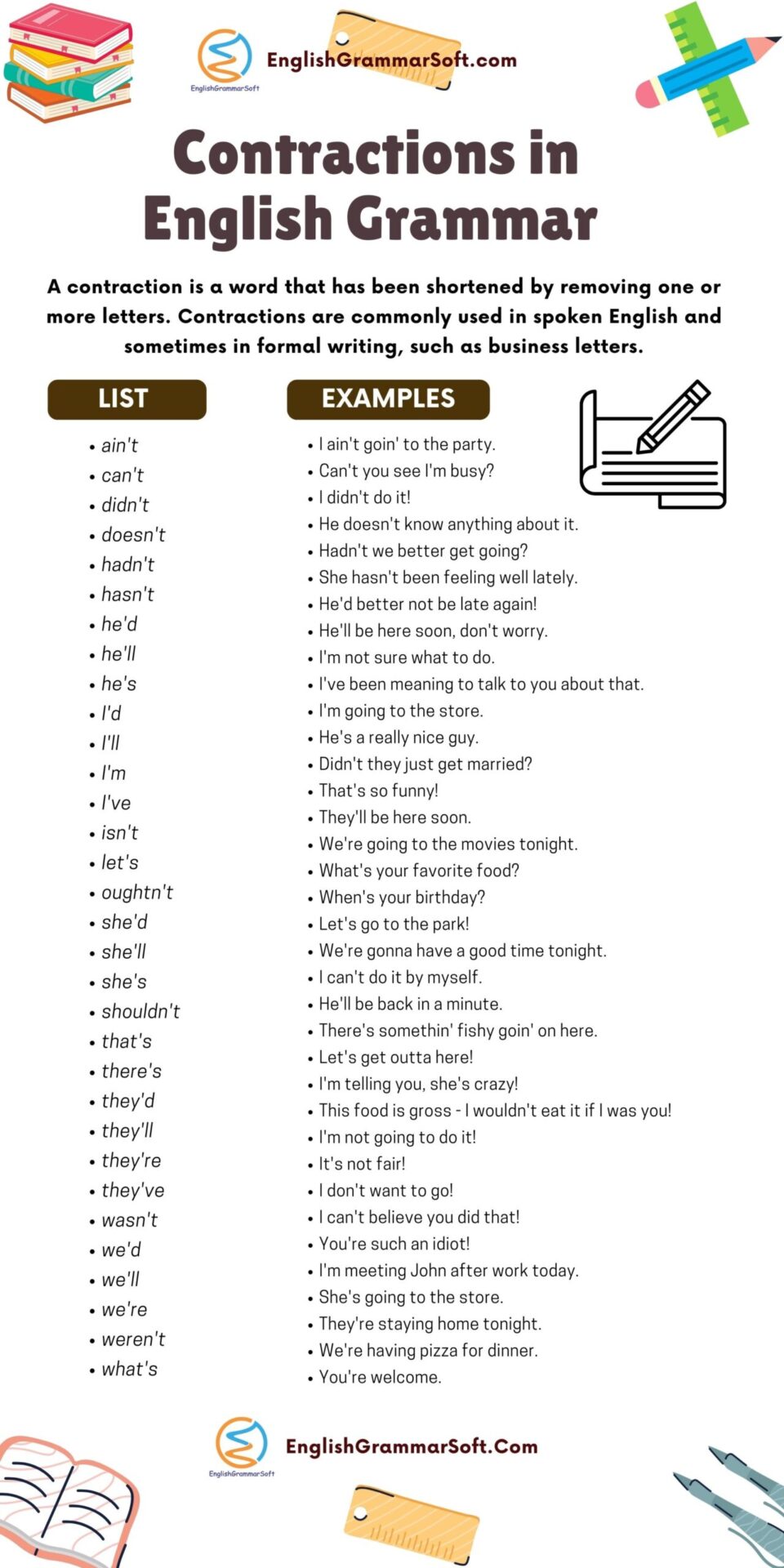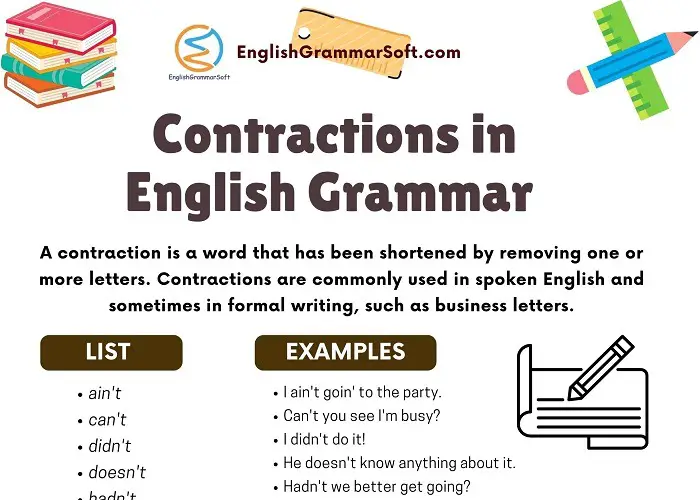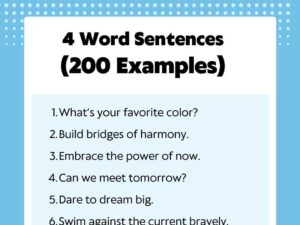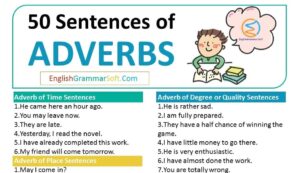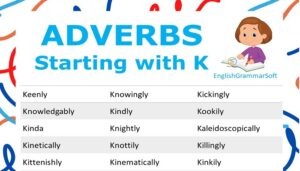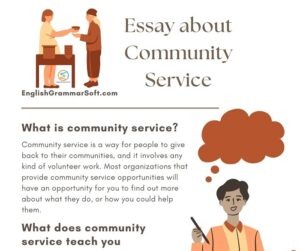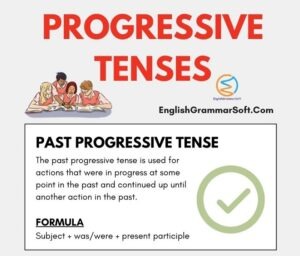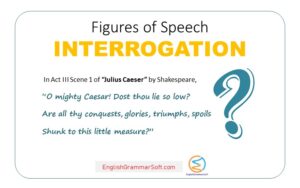Contractions in English Grammar (List & Examples)
In many cases, contractions are a necessary component of everyday life. They may be used in spoken language and informal writing to express an idea in less time or as a fast method to make a point. In formal writing, however, the apostrophe is typically used to indicate contractions, such as: I’m; we’re; and they’re.
A contraction is a word that has been shortened by removing one or more letters. Contractions are commonly used in spoken English and sometimes in formal writing, such as business letters. They are considered informal when they are used in everyday speech, such as in casual conversation and writing on the Internet.
Contractions in English Grammar
A contraction is a shortened form of two or more words that sound as if they are written as one word. From the earliest days, English has used contractions. Contractions are appropriate in some formal writing situations.
Both, formal and informal contractions can help you to make your speech sound more informal and friendly. Formal contractions are normally used in business and in academic writing. Informal contractions, on the other hand, are used in general conversations among friends.
Contractions List of Words
- ain’t
- can’t
- didn’t
- doesn’t
- hadn’t
- hasn’t
- he’d
- he’ll
- he’s
- I’d
- I’ll
- I’m
- I’ve
- isn’t
- let’s
- oughtn’t
- she’d
- she’ll
- she’s
- shouldn’t
- that’s
- there’s
- they’d
- they’ll
- they’re
- they’ve
- wasn’t
- we’d
- we’ll
- we’re
- weren’t
- what’s
What are Informal Contractions?
Informal contractions are shortened forms of words or phrases that are used in everyday speech. They are not considered to be part of standard English and are usually not found in formal writing.
Examples
- I’m gonna (I am going to)
- You’re gonna (you are going to)
- We’re gonna (we are going to)
- They’re gonna (they are going to)
Informal contractions are a feature of spoken English and don’t always translate well into writing. Using them in formal documents is probably not advisable as you want to be as formal as possible for these types of things. One of the difficulties I find with informal contractions is that we almost need to see it or hear it in order to understand what’s been said.
Read also: Difference between formal and informal language
Informal Contractions without Apostrophe
We don’t use apostrophe (‘) in all the informal contractions. For example,
Do you want ice cream? (Wanna ice cream?)
Unlike formal contraction, the informal contractions are not found in dictionary. These are not slang but spoken largely.
Some frequently used informal contractions are mentioned here.
Cos (because)
- I do not buy sweets cos I do not like them.
- Cos you are freezing, you need to wear several layers.
- Cos we were running late we couldn’t stop and pick anything up for dinner.
Dunno (Don’t know)
- I dunno what to do.
- I dunno why they like that.
- I dunno where he went.
- I dunno what to say.
- I dunno whether to be happy or sad about this.
Gimme (give me)
- Can you gimme a hand?
- Gimme some money.
- Don’t gimme that rubbish.
Gonna (going to)
- Nothing gonna change my support for you.
- I’m not gonna tell you.
- What are you gonna do?
Gotta (have got a)
- I’ve gotta gun.
- She hasn’t gotta penny.
- Have you gotta car?
- I gotta go now.
- Have they gotta work?
Init (Isn’t it)
- That’s smart. Init?
- Init strange?
Kinda (kind of)
- She is kinda cute.
- Are you kinda mad at me?
Lemme (Let me)
- Lemme go!
- He didn’t lemme see it.
Wanna (want a / want to)
- I wanna coffee.
- I don’t wanna anything from you.
- I wanna go home.
- Do you wanna watch TV?
Examples of Contractions
Here are 50 example sentences of contractions:
- I ain’t goin’ to the party.
- Can’t you see I’m busy?
- I didn’t do it!
- He doesn’t know anything about it.
- Hadn’t we better get going?
- She hasn’t been feeling well lately.
- He’d better not be late again!
- He’ll be here soon, don’t worry.
- I’m not sure what to do.
- I’ve been meaning to talk to you about that.
- I’m going to the store.
- He’s a really nice guy.
- Didn’t they just get married?
- That’s so funny!
- They’ll be here soon.
- We’re going to the movies tonight.
- What’s your favorite food?
- When’s your birthday?
- Let’s go to the park!
- We’re gonna have a good time tonight.
- I can’t do it by myself.
- He’ll be back in a minute.
- There’s somethin’ fishy goin’ on here.
- Let’s get outta here!
- I’m telling you, she’s crazy!
- This food is gross – I wouldn’t eat it if I was you!
- I’m not going to do it!
- It’s not fair!
- I don’t want to go!
- I can’t believe you did that!
- You’re such an idiot!
- I’m meeting John after work today.
- She’s going to the store.
- They’re staying home tonight.
- We’re having pizza for dinner.
- You’re welcome.
- He’s a great guy.
- She’s so happy!
- I’m not sure what you mean.
- We’re getting married next month!
- You’re not going to believe this!
- I’m going to the store.
- I’ll be back soon.
- It’s been a long day.
- I’ve been meaning to call you.
- You’re not going to believe this!
- They’re having a party tonight.
- We’re going to be late!
- I’d better get going.
- I’m sure he’s around here somewhere.
- Let’s go grab a bite to eat.
